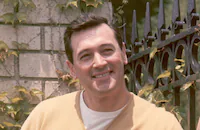Hudson stars as a conservative police detective whose life is shaken up by the arrival of Cardinale, the daughter of an Italian colleague. Thirteen years earlier, the teenaged girl had had a crush on Hudson. Now she needs his help to break into a Viennese mansion from which a friend had stolen a cache of jewels. Only it wasn't the friend who stole them; it was she. And the jewels she's placing there aren't the real thing; they're fakes designed to replace the real jewels she's out to steal. The question of Cardinale's honesty becomes moot, however, as Hudson starts falling for her and, under her influence, sheds his button-down style to embrace the free-wheeling life of an international jewel thief.
Hudson had completed his long-term contract with Universal with the World War II drama Tobruk (1967). At that point, he took a year off from acting, traveling the world until his business manager informed him that his savings were almost totally depleted. His name made it relatively easy to land leading film roles, but most of the movies he made after his hiatus did little to restore his box office position. It would take a move to television in 1971 for the first of the MacMillan and Wife telefeatures to rebuild his popularity.
At the time he made A Fine Pair, it seemed like a solid idea. Producer Franco Cristaldi had made his name with international hits like Divorce Italian Style (1961) and The Organizer (1963), both starring Marcello Mastroianni. With Cardinale as co-star and location shooting in New York City, Rome, Salzburg and the Tirol, it seemed to have the makings of an opulent international hit.
Hudson tried gamely, throwing himself into madcap chase scenes and comic interludes set in European discos. He even shared some torrid bedroom scenes with Cardinale and a scene in which his character considers smoking marijuana, a far cry from his leading roles in romantic comedies with the likes of Doris Day and Leslie Caron. At 43, he still had all of the boyish charm that had made him a star. And he still had the comic skills to match Cardinale's insouciant performance as a sophisticated jewel thief. Yet he was so polished and secure in his technique that at times he seems out of place in a film shot in a more European style influenced by France's
One of the film's chief assets is a score by one of Italy's top film composers, Ennio Morricone. Its light tone is a far cry from his more famous efforts for Westerns like The Good, the Bad and the Ugly (1966) or the epicThe Mission (1986).
Under the title Rubo al prossimo tuo ("Rob Your Neighbor"), A Fine Pair premiered in Italy in 1968. It took a year to get to the U.S., where its distributor did little to promote it. Instead of booking premiere engagements in first-run houses, National General sent it straight to neighborhood theatres on a double bill with the Elvis Presley Western Charro! (1969). By the time it hit theatres in the U.S., two films he had made later -- the espionage thriller Ice Station Zebra (1968) and the John Wayne Western The Undefeated (1969) -- had already opened. Both did well at the box office, but the former was clearly an ensemble piece, with the special effects often taking center stage. In the latter, he ceded top billing to another male star for the first time in 17 years.
Critics who caught up with the picture were far from impressed. In the New York Times, Roger Greenspun wrote, "Rarely has international jewel thievery -- or, for that matter, a few random nights with Claudia Cardinale -- seemed like more work and less fun." The Motion Picture Herald was more positive, suggesting that "Hudson continues to look younger than his years, and he performs here with a light touch that is engaging." But hopes that the stars' names would help sell the film never really came to fruition given its release pattern.
Oddly, the film's lack of a strong release has actually increased its reputation. With the picture unavailable on DVD, it remains for many of Hudson's fans a tantalizing footnote to his career, with the plot synopsis and a few random clips on YouTube suggesting the camp possibilities of his involvement in a film that keeps trying to be hip and with it while its star treats it like another of his hit comedies with Day.
Producer: Franco Cristaldi, Leo L. Fuchs
Director: Francesco Maselli
Screenplay: Virgil C. Leone, Francesco Maselli
Cinematography: Alfio Contini
Score: Ennio Morricone
Cast: Rock Hudson (Capt. Mike Harmon), Claudia Cardinale (Esmeralda Marini), Leon Askin (Chief Wellman), Walter Giller (Franz), Ellen Corby (Mrs. Walker), Tomas Milian (Roger), Tony Lo Bianco (Officer McClusky)
By Frank Miller





















